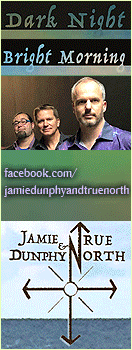 
|
||||
|
|
JAMIE DUNPHY & TRUE NORTH |
|||
|
mwe3.com presents a new interview with
Jamie Dunphy: Thank you! No More Waiting came out in March, 2019, and we began recording basic tracks for Dark Night Bright Morning that same summer. So this album actually took quite a long time to finish, longer than I would have hoped. A lot of this had to do with the pandemic, of course, but also because we were super-meticulous on this one. For example, we scratched a couple of versions of the two acoustic-based songs, “Time” and “Pieces,” because the guitars themselves just didn’t have the quality we wanted. That’s something I’ve never done before, and it was hard to swallow at first, but in the end of course I’m glad we didn’t settle. mwe3: How would you compare Dark Night, Bright Morning with No More Waiting, both musically and stylistically? Tell us about the differences in writing and recording Dark Night, Bright Morning compared with the first True North album as well as your earlier works with Mill City Trio and the neo-classical album you made called Stare Into The Sound? Are you still leading as you put it, a “triple musical life” so to speak? Jamie Dunphy: I think the two Jamie Dunphy and True North albums are pretty similar stylistically. They both have this kind of split between the Celtic-influenced rockers and the more alternative country kinds of songs. I think we probably pushed a little further in both directions on Dark Night Bright Morning with a couple of really anthemic rock songs (“The Great Divide” and “The Girl in the Boat”) and the more acoustic-based numbers. And of course it’s us a year or two later, more in sync and able to pull off things like the instrumental breaks in “Years Before” or the intro to “The Great Divide,” which we probably couldn’t have done earlier. I would say in terms of process, this new album is somewhere in between the Mill City Trio recordings, where we basically just did multiple takes of each tune and picked the best one, and Stare Into the Sound, where every little detail was planned and we did a bit more editing. For example, I came into the Dark Night Bright Morning sessions with just some vague ideas for backing vocals, and then our co-producer and engineer Brian Charles (Zippah Recording Studios, Boston) and I worked them out on the spot. I haven’t done a lot of jazz gigging these last few years, but I do still perform occasionally on lute with Night’s Blackbird, the group that grew out of the recording of Stare Into the Sound.
Jamie Dunphy: I feel very fortunate that my family was able to do all of our work and school from home this past year. For now, I’m still teaching guitar, and that was difficult to do online, but I really can’t complain. We were able to remain safe in our home most of the time, and I’m very grateful for that. The songs for Dark Night Bright Morning were completed before the pandemic began, and I can’t say I’ve done a great deal of writing since, although I do have a few new songs I’m really happy with. I focused instead on a Facebook/YouTube video series called Guitar You Out There?, for which I learned and recorded some favorite covers, did some funny split-screen stuff with some classical duets, etc. I also co-produced a benefit compilation album for Musicians Without Borders called That Song Gives You Hope, to which True North lent “The Girl in the Boat” and a couple of older songs. That Song Gives You Hope has developed into a small umbrella organization for the annual fundraising concerts I organize, and I hope to see it develop into a full-fledged non-profit. Yes, That Song Gives You Hope was released on CD and is available for purchase and download on bandcamp. True North may eventually put together a bandcamp page, but to be honest, I go back and forth about it. Obviously, the streaming model a la Spotify does not work for artists. But I also take issue with the fact that, for example, someone could go on bandcamp right now and listen to the entire That Song Gives You Hope album for free. There has to be a better way. We’ve had good success with direct mail for Dark Night Bright Morning ($15, which includes shipping, to paypal.me/thatsonggivesyouhope or Venmo: @TSGYHope. Please include a note with your address). mwe3: When was the music for Dark Night, Bright Morning written and recorded? I saw some recent pictures of you and True North wearing masks while recording. How did you and the band approach working inside the studio during the pandemic? Also tell us about the different guitars you recorded the new album with and did you do a lot of guitar overdubs on the new album? Any news on the guitar front in your world?
Oh man, I played so many guitars on this album! My main guitars are still a D’Angelico EX-SS, that I play on the heavier songs like “The Great Divide” and “Waves,” and an older Epiphone Casino, that I play on the more alt-country material. For most of the electric guitar solos, I played Brian’s Duesenberg Mike Campbell model-talk about guitar envy! The solo on “For A Future To Be Possible” was done with a classic Telecaster/slap echo kind of set up. Then there’s a Stratocaster overdub on “Time” and a bunch of different acoustic tracks. On top of all that, we brought in our good friend Greg Passler to add some additional guitar on our cover of Big Country’s “Ships.” After Greg’s solo, I come in with the E-bow lead that I recorded with my Ibanez Artcore guitar that has been retrofitted with Ghost pickups, designed by Wilf Vissenga in collaboration with Bruce and Jamie Watson of Big Country. Kind of nice to have that small connection on that track. mwe3: Is the lead off track “Time” the theme song for Dark Night, Bright Morning, considering you start the album with it and close it with an abridged version? Tell us about “Time”. Is it a hopeful or more of a realistic song? It seems very reflective. Did you write it during the pandemic and why did you re-make the song as an album closing reprise? Jamie Dunphy: “Time” definitely sets the stage for the songs that follow, which are all about my teens and early twenties, a period in which I was really lost, alone and not a particularly nice person. A few years back, I became really interested in new discoveries in physics, and what we’re starting to learn about what our universe actually is, where we actually are, etc. I started working on this collection of songs after reading Beyond Biocentrism by Robert Lanza, in which he demonstrates pretty convincingly that everything we think we know about how time and space work is completely wrong. It got me thinking that if time is cyclical or at least not entirely linear, then the past is more accessible to us than we might think. So I decided to take a deep dive into that period of my life, as a way of finally putting it behind me and moving on, of “healing the wound while there is time.” We reprise “Time” at the end of the album to imply that cyclical nature; if you listen closely, you’ll hear a little bit of the final sustained sound the closes the record at the beginning as well. It’s our “Pink Floyd” moment!
Jamie Dunphy: Yes, I would say all of the songs on this record are autobiographical. After “Time” sets things up, “Years Before” puts me back in my old hometown, reliving the moment that I realized I wasn’t a kid anymore. I was a pretty loud, boisterous kid in elementary school, always looking to get a laugh. But that was pretty quickly beaten out of me, literally and figuratively, by some classmates and teachers in middle school who tried to socialize and “normalize” me in all sorts of ways. I was complicit in it all though, and in “Years Before” I own up to committing that “original sin” of letting go of who I really was. mwe3: Is “The Great Divide” about your daughter? What does “The Great Divide” signify to you? Seems like there’s a lot of pent-up energy in that song? Is it about the great divide between people and as you say putting yourself in someone else’s shoes? Jamie Dunphy: As I mentioned, I was really lonely as a teenager, but I did finally find a handful of people I connected with. I remember vividly one night talking with my closest friend at the time and being struck by this overwhelming sadness, recognizing for the first time that we are all, at the heart of it, alone. You can never really know what it’s like to be someone else, to experience the world exactly the way someone else does. “The Great Divide” comes from the perspective of an adult who 1. has accepted this fact and has managed to forge meaningful, wonderful relationships despite it and 2. recognizes that a lot of harmful things I’ve done in the past were likely fueled by an attempt to negate or avoid this fact of life. That fear of being alone is really powerful, but it’s now mitigated for me by my belief in our interconnectedness. Again, going back to Robert Lanza, this idea that each of us is a completely separate physical entity with clearly defined boundaries is simply not scientifically true. Maybe the same can be said for mind and spirit as well.
Jamie Dunphy: “Pieces” is definitely one of the most personal songs I’ve written. In a way, it’s sort of a microcosm of the album, telling the story of my late teens and early 20’s. Definitely, I think it’s about learning to stand up for yourself, to ask for what you need and want, and to move on from people and situations that are not healthy. For me, the key to the song is the coda, specifically the lines, “I no longer ask you to be everything. I realize the pieces don’t fit perfectly.” In the past, I’ve definitely asked too much of the people in my life, and held them to a standard that I would never apply to myself. You can’t expect anyone to fill every void you may have; it took me a long time to learn that. mwe3: “Everyone But You” is welcome relief after “Pieces”. I guess it’s about past relationships and letting yourself off the hook for past mistakes as you say. The guitar solo at the end is cool. Jamie Dunphy: Yes, it’s definitely the most light-hearted song on the album. At the same time, I think it ties into some of the themes of “Pieces.” While it’s really just about being shy and not being able to tell someone how you feel about them, that inability to speak up was a real problem in many aspects of my life for a long time. And certainly, I’m still learning to let myself off the hook for past mistakes. There’s a difference between taking responsibility for your actions and continually beating yourself up over them. I’m realizing just now the connection to “Years Before,” and the lines “I’m fine with paying once. I’ll pay until you say when. But I won’t pay over and over and over again.” Thank you! I really wanted this record to be, among others things, a good guitar album, and I’m happy with how the solos turned out. The second solo on this track was really me asking, “what would Lyndsey Buckingham do?” mwe3: “Ships” is one of my personal favorites on Dark Night, Bright Morning”. I mentioned that it sounds kind of like a 1960s protest song. It’s not so much about revenge as it is about regret? I like the song lyric about “silent souls left to walk the sands evermore”… I mentioned reincarnation and being given another chance to do the things we screwed up in this life. Do you believe in reincarnation or the afterlife. I guess that’s a question everyone has!
mwe3: “The Girl In The Boat” was a track on the Musicians Without Borders That Song Gives You Hope album right? Is that a kind of fantasy song? There’s such a positive uplifting message in the song and that’s apparent in your guitar solo. What kind of message were you driving at in “The Girl In The Boat”? So there are two versions of that track? Tell us about your guitar sound in that song. Did you treat or use effects on your guitars on that track and on other tracks? Jamie Dunphy: “The Girl in the Boat” was inspired by the Thich Nhat Hanh poem, “Please Call Me By My True Names.” The song is really about empathy, about seeing the other side in a conflict and recognizing that, by a few simple twists of fate, you could just as easily be the person on the other side, holding that same viewpoint. Where we grow up and who we’re raised by makes all the difference. I know many of us would like to believe that if, for example, we grew up on a southern plantation in the early nineteenth century we would recognize the atrocities of slavery and have the courage to speak up. But how realistic is that, really? At some point of course, we must take personal responsibility for our actions and beliefs, but I think it’s important to recognize that it’s very hard to overcome one’s upbringing, and to appreciate when someone is taking even small steps to do so. So the song is kind of a rallying cry to take that recognition, to not be afraid, and to set out to really get to know and understand each other.
mwe3: “Waves” is very reflective. It starts off slow but it comes crashing in with a force of rock. Sounds like a pandemic era song. Is it filled with regret and not knowing what direction to take in life? Does life ever live up to the dream of our fantasies? But in the end you face reality and “get on with my life” as you say? Jamie Dunphy: “Waves” is really the cathartic moment on the album, hence the bombastic guitar solos! It’s about finally letting go of the past, forgiving others and myself and moving forward. I can only speak for myself, but while my life has not lived up to my adolescent fantasies, all of this other great stuff has come along that I never would have thought of in my youth. So in a lot of ways it’s better than I could have imagined. mwe3: So I guess the “Bright Morning” side of the album comes into focus on “For A Future To Be Possible”. I guess to carry on we have to “walk along and find a better way”. Is that the theme of the album. It all comes down to “we’ve got to keep the music fed”. I really hope we learn to live with that perspective in mind. Thank you for putting it into words we all can understand! Jamie Dunphy: Yes, I hope listeners aren’t disappointed that the “bright” part of the album is just one track! Well, maybe two if you count “The Girl in the Boat.” I really do believe that we can find a better way, but as I say in the song, it’s going to take new dreams and hard work. And certainly, for me at least, music is going to be a big part of it. Keep the music fed.
Jamie Dunphy: To be honest, I’m not sure how that was done. As I mentioned earlier, we basically let Brian loose on that one! I had suggested the scratchy record part of it, which I think is another nice nod to the theme of exploring the past. I like the idea that, as a story, this album could be “taking place” at any time. What Brian did with the reverberating sound at the end is really magical, I think. mwe3: So let’s talk future. Where do you see your music heading next. Is there a lesson to take away from what happened to the Earth and its inhabitants this past year? I hope people will take the time to get into Dark Night, Bright Morning. Can you give the readers any positive vibes about tomorrow? Jamie Dunphy: Musically, Jamie Dunphy and True North has some big plans. We’ll be returning to the studio this summer to record two songs that we’ll be releasing as a vinyl 7’’, and then we have a number of live dates booked starting in the fall. I think that maybe the big lesson to learn from this past year is that we’re not in charge here. We’re part of a larger ecosystem and we’re still pretty fragile and vulnerable to the forces of nature. We need to respect that fact and do a better job of caring of the planet. And of course, we need to do a better job of taking care of each other too. Not surprisingly, the pandemic seemed to bring out both the best and the worst in people. But I personally witnessed a number of really beautiful examples of people going above and beyond to take care of each other. I really hope we can hold on to that as things begin to return to “normal.” That’s not only our best chance for survival, it’s our best hope for a healthy, happy, meaningful life for all of us.
There is a line that tethers me to you I’ve been stranded here on the darker side So sail away, sail away I may still have my fortunes to squander If you could change the color of my skin And you may wonder how I’ll find you
|
|
|||
|
||||

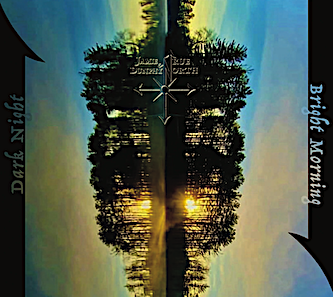 Known by his fans as both a first-rate singer-songwriter and a gifted guitarist equally at home playing rock or instrumentals, Jamie Dunphy returns in 2021 with a superbly crafted pop-rock CD called Dark Night, Bright Morning. Featuring Jamie in the studio with his band, Jamie Dunphy & True North, the album’s lead-off track, “Time” perfectly sets both mood and tone with Jamie’s acoustic guitar framing the song's lyrical message, supported by a sound that combines a timeless mix of folk and country. With its haunting lyrics, “Time” is, in some ways, the theme of the album and the song, in an abridged haunting version, is reprised again as the album-closer. While “Time” may provide an opening theme on Dark Night, Bright Morning, the 10-song, 44-minute album settles quickly into a solid pop-rock groove with more than a nod to lyric-heavy folk-rock. Key to Dark Night, Bright Morning is Jamie’s fluent guitar skills which, especially well-recorded in this setting, ranges from deft acoustic finger-style to solid rock riffing often framing his loud, cheering anthemic song hooks. Likewise, on Jamie’s 2019 debut with True North, the 2021 release of Dark Night, Bright Morning features Jamie's songs in a trio context with his long-time associates Seth Peterson (bass) and Tod Salmonson (drums). On Dark Night, Bright Morning, Jamie and his uplifting lyrical messages and vocal tonality sounds influenced by first-generation folk-rock legends such as Dylan, Phil Ochs and Don McLean, and like those early giants, highlighted by another big influence, the late Stuart Adamson of Big Country, Jamie proves to be a rocker at heart. For example, track 6 "Ships", features a cool mid '60s PF Sloan style vocal / melody approach complete with jangly guitars and Byrds-style beat. “The Girl In The Boat” has a kind of Marshall Crenshaw country-pop beat with a rapid fire Dylan-esque volley of lyrics. Folk-rock with the accent on rock, Dark Night, Bright Morning places Jamie Dunphy’s influential music into a most favorable sonic perspective.
Known by his fans as both a first-rate singer-songwriter and a gifted guitarist equally at home playing rock or instrumentals, Jamie Dunphy returns in 2021 with a superbly crafted pop-rock CD called Dark Night, Bright Morning. Featuring Jamie in the studio with his band, Jamie Dunphy & True North, the album’s lead-off track, “Time” perfectly sets both mood and tone with Jamie’s acoustic guitar framing the song's lyrical message, supported by a sound that combines a timeless mix of folk and country. With its haunting lyrics, “Time” is, in some ways, the theme of the album and the song, in an abridged haunting version, is reprised again as the album-closer. While “Time” may provide an opening theme on Dark Night, Bright Morning, the 10-song, 44-minute album settles quickly into a solid pop-rock groove with more than a nod to lyric-heavy folk-rock. Key to Dark Night, Bright Morning is Jamie’s fluent guitar skills which, especially well-recorded in this setting, ranges from deft acoustic finger-style to solid rock riffing often framing his loud, cheering anthemic song hooks. Likewise, on Jamie’s 2019 debut with True North, the 2021 release of Dark Night, Bright Morning features Jamie's songs in a trio context with his long-time associates Seth Peterson (bass) and Tod Salmonson (drums). On Dark Night, Bright Morning, Jamie and his uplifting lyrical messages and vocal tonality sounds influenced by first-generation folk-rock legends such as Dylan, Phil Ochs and Don McLean, and like those early giants, highlighted by another big influence, the late Stuart Adamson of Big Country, Jamie proves to be a rocker at heart. For example, track 6 "Ships", features a cool mid '60s PF Sloan style vocal / melody approach complete with jangly guitars and Byrds-style beat. “The Girl In The Boat” has a kind of Marshall Crenshaw country-pop beat with a rapid fire Dylan-esque volley of lyrics. Folk-rock with the accent on rock, Dark Night, Bright Morning places Jamie Dunphy’s influential music into a most favorable sonic perspective. 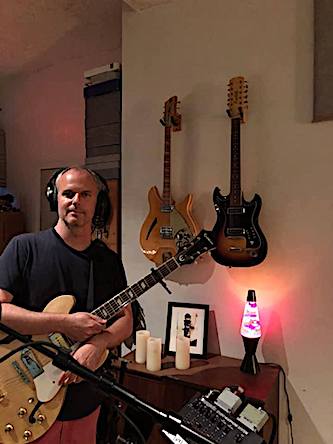 mwe3: I’m glad you released a new album in early 2021. Dark Night, Bright Morning came just a year after the first Jamie Dunphy & True North album No More Waiting. Are you becoming more prolific as far as getting more music in the pipeline? Just a great CD all around!
mwe3: I’m glad you released a new album in early 2021. Dark Night, Bright Morning came just a year after the first Jamie Dunphy & True North album No More Waiting. Are you becoming more prolific as far as getting more music in the pipeline? Just a great CD all around! mwe3: Tell us how you made it through, or rather are still making it through the pandemic of the past year. Were you or your friends and family impacted by it? I guess we’re all still scared about it on some level. How did your daughter take it? Some musicians have said that being insulated or isolated actually improved their writing. One artist told me he wrote 3 albums of material but now he’s worried that having so much music pre-written (so to speak!) will stop him from writing more. Did you write Dark Night, Bright Morning during the pandemic and was it during the pandemic time that you also became involved in the release of That Song Gives You Hope, and you’re credited as co-producer of that album. Did it come out on CD? I saw it on bandcamp but I wondered why you didn’t or don’t have a page of your own on bandcamp?/
mwe3: Tell us how you made it through, or rather are still making it through the pandemic of the past year. Were you or your friends and family impacted by it? I guess we’re all still scared about it on some level. How did your daughter take it? Some musicians have said that being insulated or isolated actually improved their writing. One artist told me he wrote 3 albums of material but now he’s worried that having so much music pre-written (so to speak!) will stop him from writing more. Did you write Dark Night, Bright Morning during the pandemic and was it during the pandemic time that you also became involved in the release of That Song Gives You Hope, and you’re credited as co-producer of that album. Did it come out on CD? I saw it on bandcamp but I wondered why you didn’t or don’t have a page of your own on bandcamp?/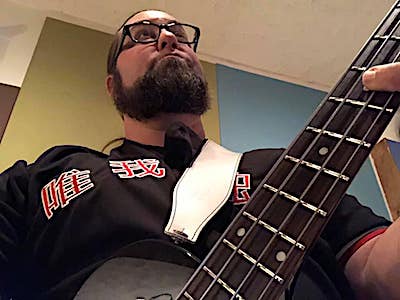 mwe3: “Pieces” starts off slowly but builds to a great rock inspired tension. It’s another reflective kind of biographical lyric. Is it one of the more intense songs you’ve written? Learning how to take the good with the bad is a true art form. It’s got a kind of Dylan inspired lyric to it. Is it about standing your ground so to speak but knowing when to move on? That is an art form in and of itself!
mwe3: “Pieces” starts off slowly but builds to a great rock inspired tension. It’s another reflective kind of biographical lyric. Is it one of the more intense songs you’ve written? Learning how to take the good with the bad is a true art form. It’s got a kind of Dylan inspired lyric to it. Is it about standing your ground so to speak but knowing when to move on? That is an art form in and of itself!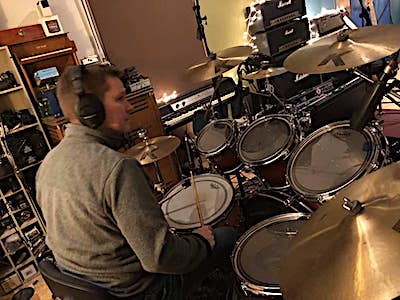 Jamie Dunphy: It might seem strange to insert a cover song into this very personal record, but “Ships” by Big Country just seemed to fit perfectly. Stuart Adamson said the song was about, “people that think they get passed by things, because everybody does at certain times.” I definitely felt this way in younger days, feeling like the world was beating me down and lamenting the lack of support. But that’s what you get when you push people away, right? It wasn’t until later in life that I learned that mutual support is the only way any of us is going to make it. The bridge, the “silent souls” section, is really haunting. What a stark image of loneliness. I had never really thought of the reincarnation angle, and I wish we could know what Adamson was thinking there. I do believe in reincarnation in sense; matter can’t be created or destroyed, so we certainly remain and return in some way. But I don’t believe that I as a personality with all of my memories, etc. will come back as an animal or anything like that. None of that is permanent in this life, so I don’t believe it will endure into the next. I practiced for some time at a Zen Buddhist sangha, and I remember the Roshi saying, “when you say I will be reincarnated, you first need to define what you mean by ‘I’.” But maybe that’s a conversation for another day!
Jamie Dunphy: It might seem strange to insert a cover song into this very personal record, but “Ships” by Big Country just seemed to fit perfectly. Stuart Adamson said the song was about, “people that think they get passed by things, because everybody does at certain times.” I definitely felt this way in younger days, feeling like the world was beating me down and lamenting the lack of support. But that’s what you get when you push people away, right? It wasn’t until later in life that I learned that mutual support is the only way any of us is going to make it. The bridge, the “silent souls” section, is really haunting. What a stark image of loneliness. I had never really thought of the reincarnation angle, and I wish we could know what Adamson was thinking there. I do believe in reincarnation in sense; matter can’t be created or destroyed, so we certainly remain and return in some way. But I don’t believe that I as a personality with all of my memories, etc. will come back as an animal or anything like that. None of that is permanent in this life, so I don’t believe it will endure into the next. I practiced for some time at a Zen Buddhist sangha, and I remember the Roshi saying, “when you say I will be reincarnated, you first need to define what you mean by ‘I’.” But maybe that’s a conversation for another day!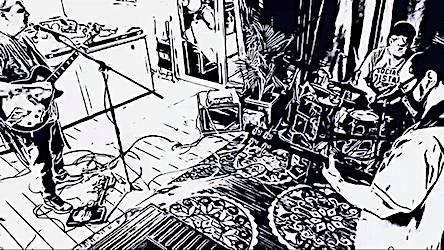 Yes, Brian felt that the mix of “The Girl in the Boat” that was included on the compilation CD didn’t sit quite right with the other tracks on this album. And after he remixed it, I totally saw what he meant. The album mix is warmer, and has a little bit more of that feeling of being in the room with us. The guitar track on both versions is actually tripled, with one panned left, one panned right and one straight down the middle. We wanted to track to sound big, but to still sound like it could be just three people playing. Brian used similar techniques on the other rockers on the album.
Yes, Brian felt that the mix of “The Girl in the Boat” that was included on the compilation CD didn’t sit quite right with the other tracks on this album. And after he remixed it, I totally saw what he meant. The album mix is warmer, and has a little bit more of that feeling of being in the room with us. The guitar track on both versions is actually tripled, with one panned left, one panned right and one straight down the middle. We wanted to track to sound big, but to still sound like it could be just three people playing. Brian used similar techniques on the other rockers on the album. 